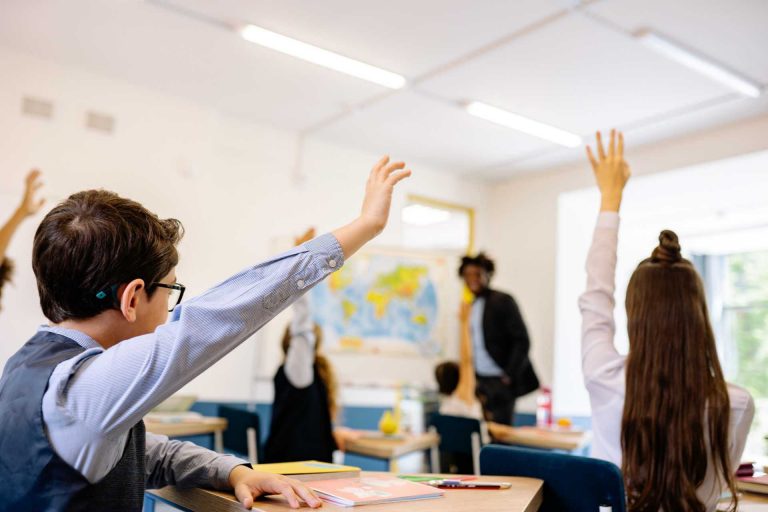How to Build Self-confidence in Children – Test Your Child’s Self-Confidence


In this article, We wanted to talk to you about building self-confidence in your child. So, what is self-confidence? Self-confidence simply means being able to trust yourself, love yourself and put your best foot forward. Confident children are not afraid to take risks, have positive beliefs about themselves and believe that they can overcome many challenges. All this makes them stronger. You can let your child in on a little secret: confident people are not inherently more intelligent, resourceful, or talented than insecure people. They have the same innate abilities and intelligence as other people, but because they are confident, they tend to develop these abilities more. All these things are actually things that every child can do. So don’t worry; you can always build your child’s self-confidence and make their life easier. Here are some tips to help your child develop self-confidence:
Insecure children often focus on their shortcomings and think these are all they have. For example, “I’m too fat,” “I have bad grades,” “I can’t tell jokes,” and “I have bad acne.” Your child can be one of these people. However, no human being is perfect, and every human has flaws. Many people are overweight, do poorly in school, and yet are confident. What they have in common is that they don’t focus only on their flaws. They can look in the mirror and say, “Yes, I have pimples, but my eyes are beautiful, and my hair is gorgeous.” This is what makes them self-confident. What about their own positive qualities according to your child? Ask them to think about this for a while before answering right away. They could ask a friend or other family members to tell them what they like about them.
Insecure people don’t take risks, and because they don’t take risks, they become increasingly insecure as time passes. When we look at confident people, they are not afraid to take risks. They raise their finger even if unsure of the answer to a question in class; they join a sports team even if they don’t know how to play sports very well. If your child does not take these first steps, they will believe they are deficient in these subjects. But with small steps, they can improve in these subjects and feel more confident over time. This week, ask your child to think about what they can do to take a step forward in issues where they would like to be more self-confident.
If we could read the thoughts of self-confident people, we would see that they are not critical and judgmental of themselves most of the time. When they make mistakes, instead of labeling themselves as “stupid” or “incompetent,” they say things like “this is an experience” and “everyone makes mistakes.” They do not see themselves only in their mistakes and believe every mistake can be corrected. They don’t give up trying. Being more compassionate towards themselves also makes them more confident.
True self-confident people’s biggest competitors are themselves, not others. They don’t think “he is better than me”; they focus on themselves. If your child compares themselves to others, there is no end to it, and they will always feel incomplete because there always seems to be someone better. They should always compare themselves with the old version of themselves. For example, what are the differences between them 2-3 years ago and now? In which areas have they improved themselves? Or where do they want to see themselves in 2-3 years? By focusing on these questions, you can help your child focus on themselves instead of other people.
If there are people around who make your child feel more insecure or say insulting things to them, they can try to set limits or spend less time with them. Instead, spending more time with people who are good for your child, who appreciate them, and who comment on their positive qualities will help your child feel more confident.
If your child is unsure whether they are confident, show them this short Self-Confidence Test we have left for you below and suggest that they take it. This will help them to get a clearer idea of themselves.
1. I consider myself as valuable as other people.
a. VERY TRUE b. TRUE c. FALSE d. VERY FALSE
2. I think I have some positive qualities.
a. VERY TRUE b. TRUE c. FALSE d. VERY FALSE
3. I tend to see myself as a failure in general.
a. VERY TRUE b. TRUE c. FALSE d. VERY FALSE
4. I can do as much as most other people can do.
a. VERY TRUE b. TRUE c. FALSE d. VERY FALSE
5. I don’t find much to be proud of in myself.
a. VERY TRUE b. TRUE c. FALSE d. VERY FALSE
6. I have a positive attitude toward myself.
a. VERY TRUE b. TRUE c. FALSE d. VERY FALSE
7. I am generally satisfied with myself.
a. VERY TRUE b. TRUE c. FALSE d. VERY FALSE
8. I wish I could have more respect for myself.
a. VERY TRUE b. TRUE c. FALSE d. VERY FALSE
9. Sometimes, I think that I am absolutely useless.
a. VERY TRUE b. TRUE c. FALSE d. VERY FALSE
10. Sometimes, I think that I am not an adequate person at all.
a. VERY TRUE b. TRUE c. FALSE d. VERY FALSE
Scoring:
Add up the points for questions 1, 2, 4, 6, and 7 as follows: Very true – 3, True-2, False-1, Very false-0. Add up the points for questions 3,5,8,9, and 10 as follows: Very true-0, True-1, False-2, Very false-3. Results: 0-15 indicates low self-confidence, 15-25 indicates normal self-confidence, 25-30 indicates high self-confidence